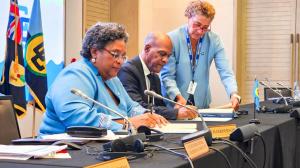BARBADOS, February 21, 2025 /EINPresswire.com/ -- At the 48th CARICOM Heads of Government Meeting in Barbados, an agreement was signed by the Prime Minister of Barbados, the Hon. Mia Mottley, in her capacity as Chairman of the regional organization, and the President of the Territorial Collectivity of Martinique (CTM), Serge Letchimy, for Martinique’s accession to the Caribbean Community (CARICOM).
This signing marks a historic milestone in Martinique’s long journey toward regional integration, following its official request to join CARICOM over a decade ago. However, the final stage of ratification – the approval of the Protocol on Privileges and Immunities by the French National Assembly – must still be completed before Martinique can officially become an Associate Member.
Martinique’s accession presents a unique opportunity to strengthen exchanges between the French territory, as an integral part of the European Union, and the 21 CARICOM countries and territories (both Members and Associate Members), encompassing approximately 18 million people. With its new status, Martinique will be positioned to develop joint projects in key economic sectors, including health care, education, transport, and disaster risk management, further establishing itself as a strategic bridge between the Caribbean and Europe.
Becoming an Associate Member of CARICOM is a key step in Martinique’s broader ambition for regional integration. The French territory has previously attained Associate Member status with the United Nations Economic Commission for Latin America and the Caribbean (ECLAC) in 2012, the Association of Caribbean States (ACS) in 2014, and the Organization of Eastern Caribbean States (OECS) in 2015.
Martinique’s accession to CARICOM brings several significant benefits for the region:
Economic development: Expanding access to Caribbean and European markets while diversifying business opportunities.
Enhanced cooperation: Strengthening collaboration in key areas such as health care, education, security, and crisis management.
Mobility and employment: Facilitating professional and academic exchanges for Caribbean consultants and students.
Tourism, sports and culture: Boosting exchanges with neighboring territories to reinforce Caribbean culture, sports, and regional tourism.
Through this accession, Martinique reaffirms its deep Caribbean identity and commitment to fostering development and innovation within CARICOM.
About the Territorial Collectivity of Martinique (CTM)
The Territorial Collectivity of Martinique (CTM) is the single local authority of the French Overseas Territory of Martinique, incorporating the Departmental Council and the Regional Council of Martinique. Created by law in 2011, its executive body is the executive council composed of nine executive directors, chaired by its president, Serge Letchimy.
The CTM’s competences are those of a French region and French department. It is responsible for economic development, education, vocational training, transport, health, and social development, as well as regional cooperation.
For further information (in French), visit www.collectivitedemartinique.mq.
About the Caribbean Community (CARICOM)
The Caribbean Community (CARICOM) is a grouping of 21 countries: 15 Member States and six Associate Members. It is home to approximately 18 million citizens, 60 percent of whom are under the age of 30, and from the main ethnic groups of Indigenous Peoples, Africans, Indians, Europeans, Chinese, Portuguese and Javanese. The Community is multilingual; with English as the major language complemented by French and Dutch and variations of these, as well as African and Asian expressions.
Stretching from The Bahamas in the north to Suriname and Guyana in South America, CARICOM comprises states that are considered developing countries, and except for Belize in Central America, and Guyana and Suriname in South America, all Members and Associate Members are island states.
While these states are all relatively small, both in terms of population and size, there is also great diversity with regards to geography and population as well as the levels of economic and social development.
For further information, visit www.caricom.org.
Jo Spalburg
Caribbean Media Partners
+44 7808585515
email us here
Legal Disclaimer:
EIN Presswire provides this news content "as is" without warranty of any kind. We do not accept any responsibility or liability for the accuracy, content, images, videos, licenses, completeness, legality, or reliability of the information contained in this article. If you have any complaints or copyright issues related to this article, kindly contact the author above.


